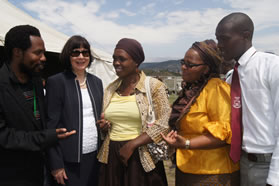COP17/CMP7 has made headlines worldwide, but for many people climate change is still an alien concept that does not affect them. Thanks to education campaigns, communities in rural KwaZulu-Natal now realise that climate change is a serious environmental challenge that affects all of us.
 Until recently, people in the uMgungundlovu District of KwaZulu-Natal didn’t know much about COP17 or the effects of climate change. But then the KwaZulu-Natal government backed their climate change education campaigns with action.
Until recently, people in the uMgungundlovu District of KwaZulu-Natal didn’t know much about COP17 or the effects of climate change. But then the KwaZulu-Natal government backed their climate change education campaigns with action.
Climate change is the long-term shift in weather patterns in a specific region or globally. Unlike global warming, which refers to just one aspect of climate change, namely a rise in the earth’s surface temperature, climate change refers to changes in a region’s overall weather patterns, including precipitation (rain, snow, sleet, hail), temperatures, cloud cover, and so on.
Taking action
More than 3 000 people gathered at the Esidadeni Sports Grounds at Mkhambathini to learn more about COP17, which is short for the 17th Session of the Conference of the Parties to the United Nations Framework Convention on Climate Change. It started in Durban on November 28 and closes on 9 December.
The community joined MEC for Finance Ina Cronjé and officials from the Department of Agriculture, Environmental Affairs and Rural Development for lessons on climate change. Residents learned about the harmful effects of climate change and what they could do to lessen the effects.
Putting into practice what they had learned, community members started removing invasive alien plant species in the nearby Msunduzi River and planting idigenous trees at the kwaNyavu Traditional Administration Centre.
Enlightened
Local traditional leader Inkosi, Skhosiphi Mdluli was delighted that the provincial government “enlightened his people”.
“Now we know that we are part of the world; whatever we do here will have an impact on the climate of the whole world,” said Mdluli. “A lot has been said about COP17 on radio and newspapers, but no-one put it into perspective for us at the grassroots level or explained how it affected us as communities. They also didn’t tell us about the role we could play to minimise risk.”
A serious issue
Some community members talked about how the climate change campaign helped them understand the seriousness of the issue.
Namelaphi Mkhize from rural kwaNyavu in Mkhambathini, works for Zibambele - an initiative by the Department of Transport. She said she didn’t know anything about COP17, despite hearing about it on the radio.
But speaking after the event, Mkhize said: “I don’t regret coming to this event because now I have a clear picture of what COP17 is all about. Before the event I thought it was about traffic cops, now it is clear as snow.”
It starts with you
Mkhize said the campaign has taught her that improving the state of the environment starts with her.
“My input towards this initiative will be to minimise on burning unnecessary fire. Now that I know the importance of planting trees, I will make sure that I don’t cut them down; I will rather plant trees especially indigenous trees.”
The campaign also provided Mkhize with a business idea. “When the MEC spoke about recycling used items, she gave me a business idea to recycle most of what would usually go to my rubbish bin. I also decided to make doormats from used plastic bags.”
Future generations
Like Mkhize, Cabangani Majozi a learner at Banqobile High School at Sidadeni, was clueless about COP17.
“I heard about it on TV and radio, but I didn’t know what it is all about, because they didn’t give clear details so that we could understand what it really means,” he said.
The young learner said he now understood that the outcomes of the COP17 would have consequences for his community.
“This is so serious, when I get back home I will tell everyone, even the youth at our sports session, to start saving water. I will visit the Department of Agriculture to get indigenous trees so that we can plant them at home and in my area. I will never litter again and I will ensure that my environment is clean. We have to do this for the sake of ourselves and future generations.”
Meanwhile, Mkhambathini Mayor, Thobekile Maphumulo, said that her council was taking COP17 seriously and she would continue educating people about climate change.



 Facebook
Facebook Twitter
Twitter WhatsApp
WhatsApp